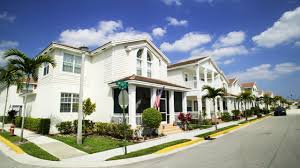Florida’s Housing Market Faces Steep Declines in 2025
Florida’s housing market — once white-hot and booming — is starting to show real signs of stress. In 2025, that picture-perfect idea of sunshine and sold signs is shifting. Rising insurance costs, wavering demand, and unpredictable economic conditions are pushing the market to what some experts now describe as “on the brink.”
Here’s a closer look at what’s really going on, what it means for everyday Floridians, and why so many are suddenly unsure about their next move.
From Frenzy to Freeze
It wasn’t that long ago that Florida’s housing market felt unstoppable. Homes were flying off the market, buyers were making offers above asking, and people from out of state were flocking in, ready to pay top dollar.
But the tone in 2025 is very different. More and more potential buyers are backing out of deals — especially in major cities like Miami, where more than 15% of pending home sales were canceled just this January. That’s one of the highest rates in the country, and it’s a telling sign: people are pulling back.
The reason? Prices are still high, mortgage rates haven’t budged much, and with inflation still impacting daily costs, many buyers are simply stretched too thin.

Inventory Is Up — But So Are Worries
One of the biggest shifts right now is inventory. As of late last year, Florida had over 166,000 active listings — up nearly 40% from the year before. At first glance, that might seem like a good thing. More houses on the market could mean more options and, hopefully, better prices for buyers.
But the demand hasn’t kept pace. Homes are sitting longer, taking an average of 48 days to go under contract — a sharp increase from where things stood just a year ago.
Sellers who thought they’d cash in quickly are being forced to wait, negotiate, or cut prices. And for some, it’s raising uncomfortable questions: should we hold off? Rent instead? Or just stay put?
The Insurance Crisis No One Can Ignore
Perhaps one of the biggest — and most personal — issues facing homeowners right now is insurance.
In a state that’s no stranger to hurricanes and floods, insurance has always been a factor. But now, it’s becoming a financial breaking point. Several major insurers have pulled out of Florida altogether, and those that remain have significantly raised premiums. For many, it’s becoming difficult to find affordable coverage at all.
It’s not just hitting people’s wallets — it’s impacting the entire buying and selling process. Deals are falling through when buyers realize they can’t secure coverage. And current homeowners? They’re being forced to make tough decisions as policies come up for renewal with new, often shocking, rates.
Fewer People Moving In, More People Staying Put
For years, Florida attracted retirees, remote workers, and families chasing warmer weather and lower taxes. But lately, that migration wave has started to slow.
Rising housing costs, combined with skyrocketing insurance and general affordability issues, are making would-be transplants think twice. That means less demand for homes — especially the larger, more expensive ones that once drew out-of-state buyers.
Locals, too, are staying put. With higher mortgage rates, many homeowners don’t want to give up their low-interest loans. So instead of upgrading or relocating, they’re opting to stay where they are and wait things out.
Renters Aren’t Catching a Break Either
And if you think renting is the safer option right now, think again.
In the Tampa Bay area, private equity firms have swooped in and bought up nearly a quarter of all apartment units. This growing trend is driving up rental prices and making it harder for people to find stable, affordable housing.
According to recent data, over 60% of renters in the area are now considered “cost-burdened” — meaning they spend more than 30% of their income just on rent and utilities. That’s up from about half in 2019.
What’s Next?
So, is Florida’s housing market in a freefall? Not exactly. But it’s certainly not the red-hot seller’s dream it used to be. Some experts are predicting home values could drop by as much as 10% in certain areas this year — especially if the current trends continue.
Still, it’s a mixed bag. Some neighborhoods are holding steady, others are softening quickly. What’s clear is that whether you’re buying, selling, or renting, this market takes more patience — and planning — than ever before.


Comments are closed, but trackbacks and pingbacks are open.